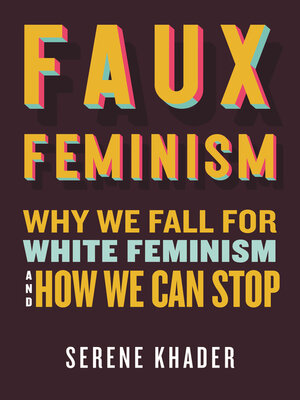
Sign up to save your library
With an OverDrive account, you can save your favorite libraries for at-a-glance information about availability. Find out more about OverDrive accounts.
Find this title in Libby, the library reading app by OverDrive.



Search for a digital library with this title
Title found at these libraries:
| Library Name | Distance |
|---|---|
| Loading... |
Winner of the North American Society for Social Philosophy's 2025 Best Book Award
For readers of Hood Feminism and Against White Feminism, an incisive examination of why the pillars of feminism have eroded—and how all women, not just the #girlbosses, can rebuild them
After over 175 years, the feminist movement, now in its fourth wave, is at risk of collapsing on its eroding foundation. In Faux Feminism, political philosopher Serene Khader advocates for another feminism—one that doesn’t overwhelmingly serve white, affluent #girlbosses. With empathy, passion, and wit, Khader invites the reader to join her as she excavates the movement’s history and draws a blueprint for a more inclusive and resilient future.
A feminist myth buster, Khader begins by deconstructing “faux feminisms.” Thought to be the pillars of good feminism, they may appeal to many but, in truth, leave most women behind. Khader identifies these traps that white feminism lays for us all, asking readers to think critically about
–The Freedom Myth: The overarching misconception that feminism is about personal freedom rather than collective equality
–The Individualism Myth: The pervasive idea that feminism aims to free individual women from social expectations
–The Culture Myth: The harmful misconception that “other” cultures restrict women’s liberation
–The Restriction Myth: The flawed belief that feminism is a fight against social restrictions
–The Judgment Myth: The fallacy of celebrating women’s choices without first interrogating the privileges afforded or denied to the women
In later chapters, Khader draws on global and intersectional feminist lessons of the past and present to imagine feminism’s future. She pays particular attention to women of color, especially those in the Global South. Khader recounts their cultural and political stories of building a more inclusive framework in their societies. These are the women, she argues, from whom today’s feminists can learn.
Khader’s critical inquiry begets a new vision of feminism: one that tackles inequality at the societal, not individual, level and is ultimately rooted in community.
For readers of Hood Feminism and Against White Feminism, an incisive examination of why the pillars of feminism have eroded—and how all women, not just the #girlbosses, can rebuild them
After over 175 years, the feminist movement, now in its fourth wave, is at risk of collapsing on its eroding foundation. In Faux Feminism, political philosopher Serene Khader advocates for another feminism—one that doesn’t overwhelmingly serve white, affluent #girlbosses. With empathy, passion, and wit, Khader invites the reader to join her as she excavates the movement’s history and draws a blueprint for a more inclusive and resilient future.
A feminist myth buster, Khader begins by deconstructing “faux feminisms.” Thought to be the pillars of good feminism, they may appeal to many but, in truth, leave most women behind. Khader identifies these traps that white feminism lays for us all, asking readers to think critically about
–The Freedom Myth: The overarching misconception that feminism is about personal freedom rather than collective equality
–The Individualism Myth: The pervasive idea that feminism aims to free individual women from social expectations
–The Culture Myth: The harmful misconception that “other” cultures restrict women’s liberation
–The Restriction Myth: The flawed belief that feminism is a fight against social restrictions
–The Judgment Myth: The fallacy of celebrating women’s choices without first interrogating the privileges afforded or denied to the women
In later chapters, Khader draws on global and intersectional feminist lessons of the past and present to imagine feminism’s future. She pays particular attention to women of color, especially those in the Global South. Khader recounts their cultural and political stories of building a more inclusive framework in their societies. These are the women, she argues, from whom today’s feminists can learn.
Khader’s critical inquiry begets a new vision of feminism: one that tackles inequality at the societal, not individual, level and is ultimately rooted in community.







